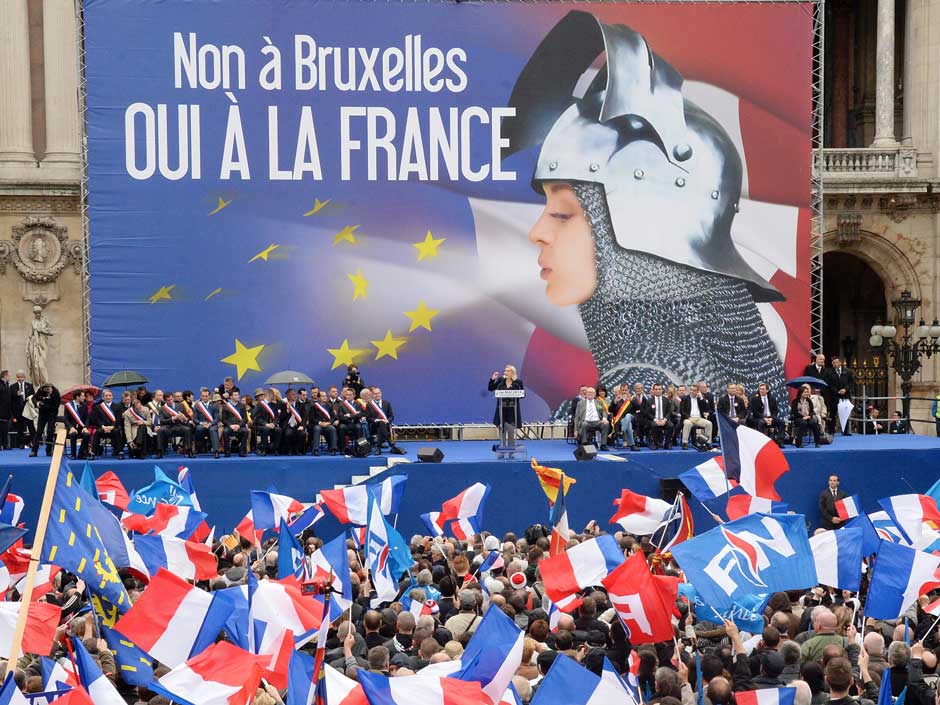Europe has a problem, and Ukraine might be the solution.
In the elections that took place across Europe on Sunday for the European Parliament, turnout was low (43 percent), and the anti-European far right made substantial gains, most notably in France, where the National Front took 25 percent. In the election that took place the same day for the Ukrainian presidency, turnout was high (61 percent), the victorious candidate ran on a pro-EU platform, and the far-right candidates (2 percent) were beaten by everyone, including the Jewish candidate. If Europeans voted the way Ukrainians did, Europe could count on a far more secure and prosperous future.
One reason for this debacle is the alternative reality where many Europeans have been living in 2014. On the European left, especially the German left (in particular the party Die Linke), criticism of the purported fascism of the post-revolutionary government in Ukraine has been de rigeur. No amount of information and argumentation was able to change this fixation. It can only be hoped that these electoral results—which bring to the European Parliament a Greek party that is openly neo-Nazi and a Hungarian party that is unambiguously anti-Semitic—will open some eyes. The European left has a real problem, and it is not the Ukrainian far right. It is the European far right, which happens to be popular, and is supported by the Russian far right, which happens to be in power in Moscow.
Meanwhile, the fantasy on offer from the European far right this year has been the nation-state. If only Scotland, or England, or France, or Austria, or Greece, or Bulgaria could finally be free of pushy European bureaucrats, then life would return to normal and all would be well. All would not be well. It is natural to complain about distant bureaucrats who do not understand the local realities. But it is another thing entirely to mistake the normal frustrations of any large polity for a program. The nation-state is a utopia. There is no way back to it. Europeans who believe that disintegration is a good idea should consult the history of the 1920s and 1930s. Or ask Ukrainians confronting a Russian annexation of Crimea and Russian-backed aggression in their southeastern provinces.
The leaders of the European far right, helped by the recent woolly-headedness of much of the European left, are moving their peoples not back toward the nation-state (which is impossible) but toward Russian domination of Europe. Despite various disagreements, this is one point on which the European populists, fascists, and neo-Nazis agree: Putin is an admirable leader whose ideas on Europe are sound. Parties like the National Front, Britain’s UKIP, Italy’s Northern League, Belgium’s Vlaams Belang, and Hungary’s Jobbik pose as nationalists while supporting the policies of a foreigner who makes no secret of his goal of dominating their lands.
The betrayal of patriotism by the supposed patriots is clear enough. What makes the betrayal grotesque is the actual power balance. Europe is far stronger than Russia. The Putin regime, knowing its own weakness, is seeking protection from China. Thus many Europeans elect people who want Europe to become a dependency of a foreign power, which itself is leaning toward China as its main ally. It is probably fair to say that not many voters for the European far right actually want to live in Russia or China. They are voting for a fantasy of separation from the world, and what their leaders mean to give them is integration into a world that they will like much less.
The shocking electoral outcomes in Europe will clear some heads, but something much grander is needed. What we have seen in the decade since the last major enlargement of the EU—ten new countries joined in 2004—is that the European Union cannot stand still. It needs challenges and it needs prospects. It needs the energy and enthusiasm of people who do not take freedom and order for granted but who are willing to work for them. In the Ukrainian revolution, people fought carrying the EU flag; in the Ukrainian elections, people stood in line for hours wearing EU symbols. The European Union has been enlarging since its establishment as the European Communities, and it will and should continue to do so. A promise of further enlargement would not be expensive: on the contrary, the incentives for reform and for investment would reduce the need for future aid.
Ukraine, meanwhile, needs help. Its revolution began as a protest against the previous regime, which at the last moment rejected an important trade deal with the European Union known as an association agreement. This agreement will soon be in force and will help provide a template for reform and some access to EU markets. But it is far short of full membership in the EU. Here arises an opportunity that for both sides would be cheap, elegant, attractive, and effective.
Advertisement
If the European Union would give Ukraine formal status as an EU candidate and announce that it can become a full member in say ten years if it meets the necessary administrative and political criteria, two things would immediately happen. First, Ukraine would have now, as Poland and others had before it, a positive incentive to eliminate corruption, which is the great scourge of the country, since it would be clear what could be had in return. Second, international investors, including Russian investors who are currently leaving Russia, would come to Ukraine. The economic development this would bring to Ukraine would be of great benefit to the EU, since it would stabilize the eastern frontier, and demonstrate that European values are not just attractive but effective.
Europe needs that—not so much to remind others, as to remind itself.



